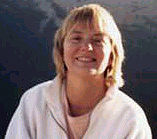Degrees: BS in Chemistry and PhD in Physiology
Graduate School: University of Medicine and Dentistry of New Jersey
Undergraduate School: University of Delaware
Current Position: Grants Facilitator in the Office of Research and Sponsored Programs and Adjunct Associate Professor of Neurobiology and Pharmacology; Northeastern Ohio Universities College of Medicine

While in a college program in chemistry, I became disillusioned. It was not what I had pictured it to be; I was beginning to understand that being a chemist was NOT the Hollywood fairytale. Some concepts in chemistry were hard for me to comprehend, atomic and subatomic physics, for example. I almost dropped out, but I am not a quitter. Persevering, I graduated and took a position as an analytical chemist in toxicology, with a large chemical manufacturer as an analytical chemist in toxicology. Up to that point, I had never worked with or been around pets or lab animals. In this job, I performed chemical tests on biological samples from experimental animals. As a chemist with little biology, I had not realized that these animals (and humans) were comprised of 'chemicals.' My job was to report on levels of the chemicals in the body fluids, not ask why they changed. While I loved this job because I learned a lot, we did not ask questions about how things worked. After a few months, I was encouraged by my supervisor to apply for graduate school in physiology, since, he reasoned, it was the physics and chemistry of the body that interested me.
So, I was off to graduate school to concentrate inWHAT? While trying to find a direction, which coincided with taking some courses in neuroscience, I developed an interest in brain physiology and behavior. Four years later, I received my Ph.D. and did postdoctoral work in electrophysiology in a lab investigating taste and how the brain interprets this sensory signaling. A second postdoctoral position led me to microscopic investigations of the brain systems that control the heart and autonomic nervous system. This research opened a new horizon for me, as I combined understanding the 'heart connections' with behavior, emotions and epilepsy. I had an independent "bench" (laboratory) research career for a number of years in this area.
I conducted basic research for a total of 18 years. I worked with a number of species of animals asking questions about how the brain worked. I utilized a variety of techniques to answer these questions. I had funding for my projects and I published my results in scientific journals. At a certain point, however, I recognized that this was not what I wanted to do for the rest of my career. I see the 'big picture' better than the molecular picture, and I wanted to do more with science than bench work and hypothesizing. Thus, I searched for a career that would incorporate my knowledge of science with something global.
Five years after this search began, I began a position called "grants facilitator" and have a joint faculty appointment in neurosciences. As trends in biomedical research have switched from pure academia, i.e. endeavors in scholarly activities, to more business-like and entrepreneurial approaches to science, scientists require retraining to meet these new challenges and to be competitive. Here is where the facilitator enters the loop. My role in the research program at our medical college is to enhance or facilitate research. This broadly includes working with faculty on brainstorming scientific ideas, grantsmanship (helping faculty write good grants), mentoring and counseling on career and ethical issues. I assist in identifying appropriate funding sources for projects and in developing innovative ideas that match the missions or requests of funding agencies. Because of personal experience as a basic scientist and as grant reviewer with the various scientific institutions and government agencies, I can critically evaluate, review and edit applications in-house prior to submission to the granting agency. If a grant is turned down, I assist with preparation of revisions, rebuttals and strategizing for applying to other sources of funds. Thus, I serve as a non-specialist scientific reviewer and editor, not as the peer expert in that particular field, to ensure that the hypothesis, organization, format, and other considerations are a logical progression of ideas. I also verify that the grant conforms to the published guidelines of the agency to which it will be submitted. Critical review by peers and non-specialists prior to submission is essential. For scientific manuscripts and publications, I follow a similar procedure as for grants, making suggestions prior to journal submission.
The process I use to facilitate science begins with an interview with the investigator, to learn about their research interests, future directions, goals, research environment and barriers or limitations to successful conduct of the project. Because of this interaction, I am in an ideal position for further mentoring and educating the established faculty, as well as junior scientists, graduate students, postdoctoral fellows and residents (MDs). I have developed several 'coaching' programs for professional development which I share with investigators. My wide interests in science, along with skills in communicating complex ideas to nonprofessionals, enables me to be an outreach scientist for the college, interacting with primary and secondary education teachers and students, public groups, and the general public; I interpret science and educate the public.
![[email]](./gif/menue.gif)

